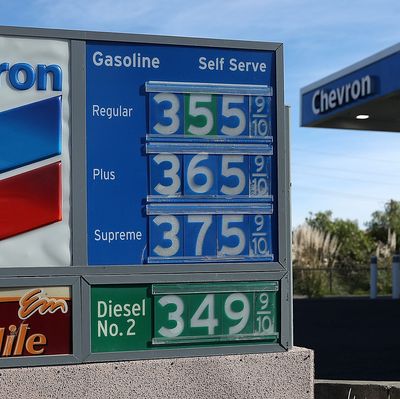
Memorial Day is generally considered the beginning of the summer “peak driving season,” which usually means relatively high gasoline prices. In years when prices at the pump have been increasing anyway, peak prices can drift over the line that separates a minor annoyance from a perceived blow to family budgets and a potential political issue.
In 2018 a variety of factors, including a long-term oil supply/demand imbalance, a robust economy, production cuts from OPEC and Russia, the collapse of the Venezuelan oil industry, and the Trump administration’s destabilizing Middle East policies, have combined to boost both crude oil and gasoline prices significantly. On average pump prices are up 60 cents a gallon since last Memorial Day — from $2.37 to $2.97, impinging on the psychologically significant $3-per-gallon benchmark.
Gasoline prices usually begin falling by the end of summer, and some of the factors producing more general upward pressure on prices could abate or even reverse. A June 22 meeting between OPEC and Russian energy authorities could lead to a boost in global crude-oil production, for example.
But in the meantime, unhappiness about the price of gasoline is already beginning to creep into Democratic political messages, dangling another anvil above vulnerable Republicans facing an already difficult midterm election, as Politico notes:
“There’s a straight line between Trump’s policies and the price of gasoline,” Rep. Brian Schatz (D-Hawaii) said in a brief interview, echoing a growing chorus of Democrats.
Voters are already feeling spooked: Forty-two percent of Americans won’t take a road trip for summer vacation this year, a much higher percentage of people than last year, and many of them cited higher gas prices as the reason, according to a survey by gas station data company GasBuddy.
Democrats are also using gasoline prices as part of their attack on the 2017 GOP tax bill, which showered many benefits on the very oil companies that harvest high profits from high pump prices, as a report from Senate Finance Committee Democrats led by Ron Wyden argued:
Wyden’s panel released a report highlighting the fact that the nation’s four largest oil companies are poised to reap some $15 billion in tax benefits over the next decade from the GOP’s tax law, while gas prices reach their highest levels in years. Sen. Ed Markey (D-Mass.) released his own staff report using the same tactic, blaming higher prices on “President Trump’s incoherent foreign policy.”
It all makes good political sense, and Republicans who deployed exactly the same attacks on Barack Obama for an earlier gasoline-price spike are not in a great position to cry “Unfair!”
But there is one problem with this tactic that could become more obvious as the midterm general election approaches: In one state with especially high gasoline prices, California, voter unhappiness with being gouged at the pump could be deflected onto the state’s Democrats. Early in 2017, the Democratic-dominated California legislature, at the urging of Democratic governor Jerry Brown, approved an increase of nearly 20 cents per gallon in gasoline taxes (plus some higher vehicle fees) — fully phased in by January of 2019 — to begin dealing with about a decade of backlogged road- and bridge-repair projects. It is not official yet, but it appears an initiative heavily backed by the California GOP and major Republican candidates will be certified for the November ballot, revoking the current increase and creating new barriers to excise tax hikes in the future.
California Republicans hope this ballot initiative will be a major base-turnout generator in November, partially blocking any Democratic “wave” that might otherwise be building. And if that happens, it could be a problem not just for California Democrats, but for the Donkey Party nationally, which is counting on picking up Republican-controlled seats in the Golden State (as many as seven are currently deemed quite vulnerable by the Cook Political Report) in its drive to reclaim control of the U.S. House.
It is already clear that the pending initiative could be popular. A PPIC poll back in January showed 47 percent of likely voters supporting a gas-tax repeal with 48 percent opposed. More recently, an April/May Los Angeles Times/USC survey of registered voters showed the repeal initiative favored by a 51/38 margin.
So far, most of the noise on this subject has come from the anti-tax agitators, who never lack for a constituency. But that’s beginning to change, as Dan Walters notes:
[Jerry] Brown’s Department of Transportation and the state Transportation Commission are moving at warp speed to pump out as many new projects as possible, and those are being heavily publicized by state and local officials, including Brown.
Earlier this month, for instance, Brown and Southern California officials, including Los Angeles Mayor Eric Garcetti, staged an event at Union Station in downtown Los Angeles to puff $1.2 billion for “fixing California’s crumbling transportation infrastructure.”
Unions and businesses benefitting from all the ‘dozers springing to life will fight to defend the gas-tax increase, and as Walters reports, Brown himself has some leftover millions in campaign money (he is finally retiring this year) that he might decide to deploy against the repeal drive.
But the fact remains that to the extent a gasoline-price spike benefits Democrats nationally in November, it could hurt them in California. And that’s something Democrats east of the Sierra Nevadas might want to keep in mind before making pump prices a big national issue.






























